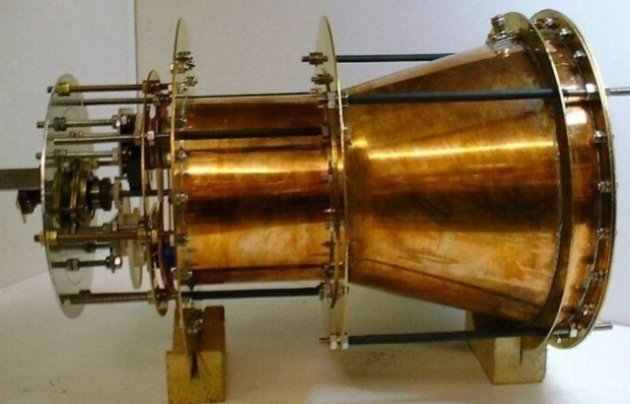 Engineer Roger Shawyer’s
controversial EmDrive thruster jets back into relevancy this week, as a
team of researchers at NASA’s Eagleworks Laboratories recently
completed yet another round of
testing on the seemingly impossible tech. Though no
official peer-reviewed lab paper has been published yet, and NASA
institutes strict press release restrictions on the Eagleworks lab these
days, engineer Paul March took to the NASA Spaceflight forum
to explain the group’s findings. In essence, by utilizing an improved
experimental procedure, the team managed to mitigate some of the errors
from prior tests — yet still found signals of unexplained thrust.
Engineer Roger Shawyer’s
controversial EmDrive thruster jets back into relevancy this week, as a
team of researchers at NASA’s Eagleworks Laboratories recently
completed yet another round of
testing on the seemingly impossible tech. Though no
official peer-reviewed lab paper has been published yet, and NASA
institutes strict press release restrictions on the Eagleworks lab these
days, engineer Paul March took to the NASA Spaceflight forum
to explain the group’s findings. In essence, by utilizing an improved
experimental procedure, the team managed to mitigate some of the errors
from prior tests — yet still found signals of unexplained thrust.
Flying in the face of
traditional laws of physics, the EmDrive makes use of a magnetron and
microwaves to create a propellant-less propulsion system. By pushing
microwaves into a closed, truncated cone and back towards the small end
of said cone, the drive creates the momentum and force necessary to
propel a craft forward. Because the system is a reaction-less drive, it
goes against humankind’s fundamental comprehension of physics, hence its
controversial nature.
On the NASA spaceflight forums,
March revealed as much as he could about the advancements that have
been made with EmDrive and its relative technology. After apologizing
for not having the ability to share pictures or the supporting data from
a peer-reviewed lab paper, he starts by explaining (as straightforward
as rocket science can get) that the Eagleworks lab successfully built
and installed a 2nd generation magnetic damper which helps reduce stray
magnetic fields in a vacuum chamber. The addition reduced magnetic
fields by an order of magnitude inside the chamber, and also decreased Lorentz force interactions.
Continue Reading at .... http://finance.yahoo.com/news/nasa-latest-tests-show-physics-230112770.html